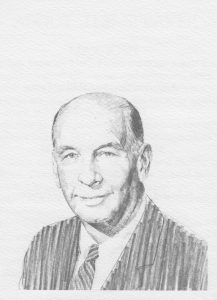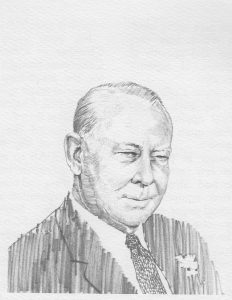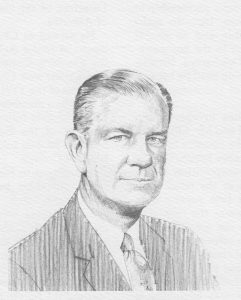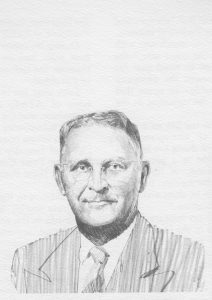In 1921, two brothers purchased a 20 by 50 frame store on the corner of Lawrence and Canal Streets in Mobile, Alabama. With a $1,000 capital investment, they opened a new type of “cash and carry” grocery store a store that evolved into a multi-million dollar corporation Delchamps, Inc. – which today operates 79 stores in four states. A driving force behind this success story was Alfred Frederick Delchamps, who not only rose to Chairman of the Board of the Corporation but also became a leading citizen of Mobile.
Alfred Frederick Delchamps was born in Mobile on January 25, 1895, the second child of Alfred W. and Anna Maria (Theuer) Delchamps. When young Alfred was five years old, his father died, and the youngster soon began working to help support his family. He picked produce on a farm in exchange for part of a crop, which he then sold from door to door. While in the second grade (after which his formal education ended), he worked as a cash boy in department stores for $2.50 a week. As a youth, he worked for the Pinch Gas Company and then as a mailroom supervisor for the Mobile News-Item, until he joined the U.S. Army Medical Corps in May 1917.
Throughout these years and later, the young man (who later confessed that he would like to have become a “professional man”) managed to study at night school at the YMCA, take correspondence courses, and read widely.
After discharge as a sergeant in May 1919, Alfred Delchamps returned to Alabama and secured work at the Gulf Shipyards in Chickasaw. When he was laid off because of a reduction in naval construction, he “bought himself a job.” He purchased a small grocery store (the New York Cash and Carry #10) which he operated alone for several months. When his younger brother Oliver lost his job at the ship yard, they pooled their (and their family’s) savings to purchase a larger store on the corner of Lawrence and Canal Streets. This first of the Delchamps grocery stores opened on a warm November day in 1921.
When Alfred Delchamps later reminisced about this beginning of Delchamps, Inc., he said that the first store had to be “cash and carry” because daily business was the only source of cash flow. The $1,000 investment had “emptied our pockets and filled us with enthusiasm” to succeed. To attract customers, the partners began to offer low prices every day on quality merchandise, at a time when most other cash and carry stores relied on weekend specials and carried poor quality merchandise and when quality merchandise was usually found only in higher-priced, credit and delivery stores.
The store thrived on the policy of low-profit margins on quality foods. For each of the next five years, Delchamps Grocery Company opened another unit and “ended up with a chain of small frame stores-and everybody in the family working.”
The company opened its first ware house in 1927. By 1937, Delchamps was operating 10 stores, making it the dominant, growing company in the area. In 1946, with 15 stores, the company was changed from a partnership to a corporation-Delchamps, Inc.-to make further expansion possible and enable employees to own shares in the company. At that time, Alfred Delchamps became President, a position he held until he became Chairman of the Board of Delchamps, Inc. in 1965.
In 1921, the Delchamps brothers (who became known as Mr. Al and Mr. Ollie) had been among the first in the country to put a low-profit margin on quality foods. During the ensuing years, the corporation established a record of firsts in the retail food industry, including the first supermarket size food store in Alabama; the first selfservice meat markets in the area; the first chain in the Southeast to offer generic label products as an additional choice for its customers; and among the first in the region to introduce computerized checkout systems.
As Alfred Delchamps was becoming a leader in the retail food industry, he was also becoming a leader in educational, civic, and religious organizations in the community.
This self-educated man showed his respect for formal education through 12 years ser vice as a member of the Board of Education of the Mobile County Public Schools including two terms as president of that board. For more than ten years he was a member of the Board of Mobile County Foundation for Higher Education. He served as president of the Board of Trustees of Huntingdon College in Montgomery and was made a lifetime member of this board by special act of the North Alabama and Alabama-West Florida Conferences of the Methodist Church-the first to be designated as such.
Always interested in every aspect of com community development, he contributed his time as a member of the Commission to bring the U.S.S. Alabama to Mobile and of the Revolving Fund Board of the Mobile Historic Development Commission. He was a president of the Industrial Development Board of the Mobile Chamber of Commerce and a director of the Mobile Safety Council.
He was the first man to serve twice as a Campaign Chairman of the Mobile Community Chest, of which he was also president for a year. He was a member of the Board of Directors of the United Fund and Councils of America.
He served as Chairman of the Advisory Board of Junior Achievement; Chairman of the Planning Committee for the American Red Cross; and Chairman of the Board of Trustees of the YWCA.
He was a member of the Board of Trustees of the Mobile Infirmary Association and a member of the Building Commission for both the Mobile Infirmary and the Alabama Medical College.
In addition to his other activities, Alfred Delchamps also became a leader in the Methodist Church. When he and his brothers and sisters were small, his widowed mother insisted that they go to Church every Sunday. As children, they all attended the Methodist Church nearest their home.
Alfred Delchamps became chairman of the Board of Trustees of Dauphin Way Methodist Church; a president of the Mobile Federation of Churches; a member of the Board of Trustees of the Religious Heritage of America; and a member of the Jurisdictional Advisory Board of the Chandler School of Theology.
In 1950, Alfred Delchamps was named Mobilian of the Year and in 1963, “Man of the Year” by the Phi Delta Kappa honorary educational fraternity. In 1955, he was granted an honorary Doctor of Laws degree from Huntingdon College.
Nine years after the first Delchamps retail food store opened, Alfred Delchamps married Lucile Crowell of Mobile. They became the parents of three children: Alfred Frederick, Jr. (now President of Delchamps Inc.); Margaret (now Mrs. Edward W. Young); and Lucile (now Mrs. Richard T. Nelson.)
Alfred Delchamps died in Mobile on July 22, 1978. His leadership in business, education, civic, and religious affairs might be attributed to the philosophy that a person must, “Do what you have to do the best you can and if you have to do it tomorrow, do it better.”
Alfred Delchamps was a kind man who knew business, but most of all knew people. He believed a person did not just make friends but had to be a friend.





